Being a notable issue of the Jefferson Nickels, the 1941 Nickel is known for its high-quality strikes. With that, can these five cents provide high value? Well, that’s what we will answer with this 1941 Nickel Value Guide.
1941 Nickel Value Overview
According to our market research, below is the estimated value for the 1941 Nickel. As you can see, the value for these particular coins varies greatly, especially in their higher 6FS and 5FS strike characters.
| Mint Location | Mintage | Coin Series | Estimated Value |
| Philadelphia | 203,265,000 | 1941 P 5C MS | $0.10 to $500.00 |
| 1941 P 5C MS 6FS | $1,000.00 | ||
| 1941 P 5C MS 5FS | $25.00 to $5,000.00 | ||
| 1941 P 5C PF | $20.00 to $10,000.00 | ||
| Denver | 53,432,000 | 1941 D 5C MS | $0.10 to $70.00 |
| 1941 D 5C MS 6FS | $70.00 to $8,250.00 | ||
| 1941 D 5C MS 5FS | $20.00 to $4,000.00 | ||
| San Francisco | 43,445,000 | 1941 S 5C MS | $0.10 to $250.00
|
| 1941 S 5C MS 6FS | $800.00 | ||
| 1941 S 5C MS 5FS | $10.00 to $3,250.00 |
That said, the face value for the regular strike 1941 Nickel starts at $0.10, regardless of its mint location. The significant jump in their prices is more apparent in the later uncirculated gradings, with a price of $70 to $250.
The Full-Step designation features a higher value, with the starting 5FS at $25 to $5,000. Meanwhile, the 6FS offers the value at $800 to $8,250.
Finally, the highest value comes with the proof coins at $20.00 to $10,000.
1941 Nickel History
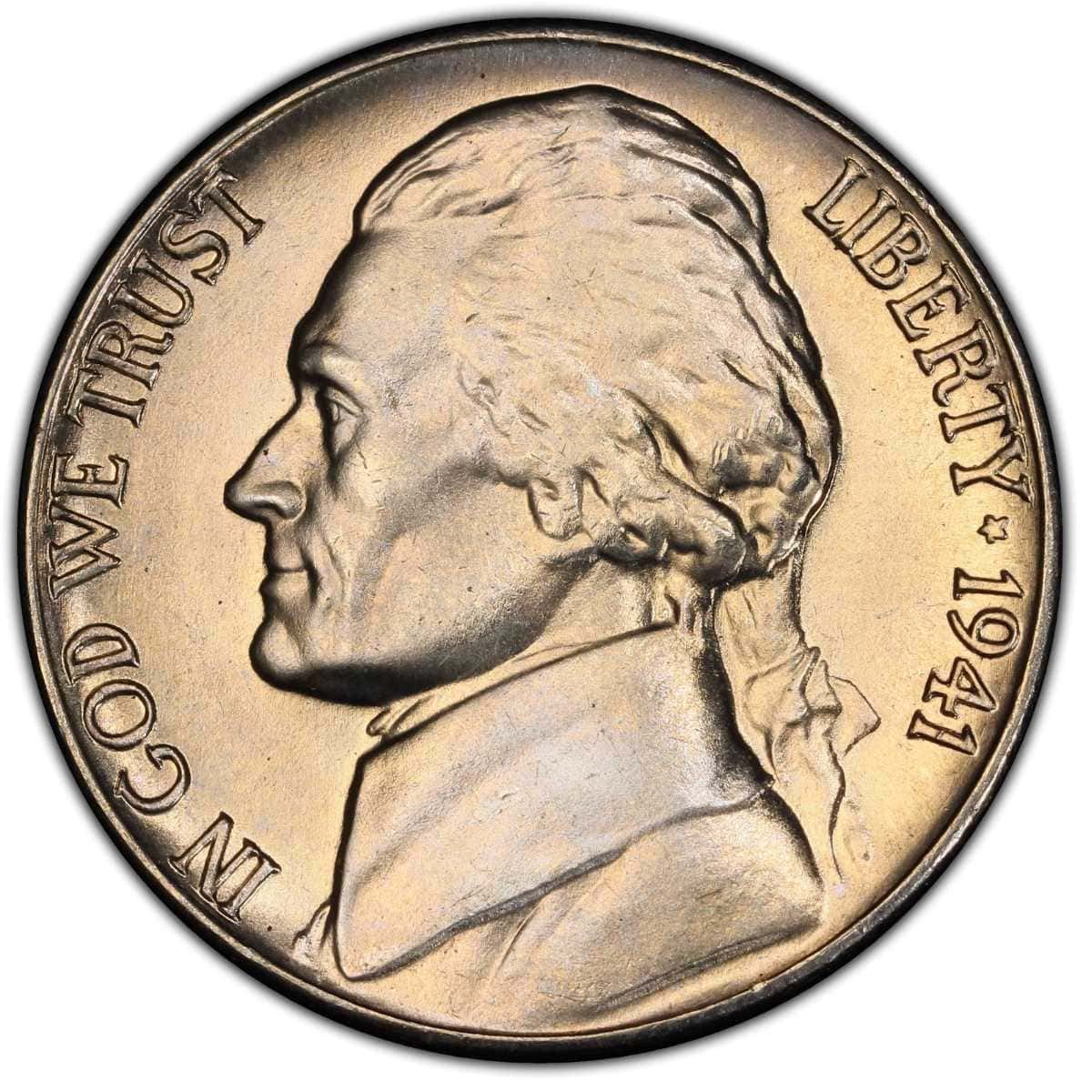
The Jefferson Nickel has been in production for generations and remains a staple in American currency. Introduced in 1938, it remains the only coin made with its original materials. Despite a brief interruption during World War II, this coin has now been minted for over six decades.
When the Jefferson Nickel first came out, a lot of people were intrigued by its uniqueness and saved it, making it difficult to find in circulation until around the 1940s. The start of World War II caused several raw materials (such as nickel) to be rationed.
Some of the 1941 coins were also sought for their nickel content, leading to the melting of many of the coins. In fact, during World War II, the composition of the nickel was temporarily changed to include silver, along with copper and manganese.
This increases the price of the coin. As most become used in circulation, the higher uncirculated grades become rarer, especially today. This does not affect only those in the regular strike, but the proof coins also increased in estimated value.
1941 Nickel Details
- Category: Jefferson Five Cents
- Weight: 5g
- Diameter: 21.2mm
- Composition: 75% copper, 25% nickel
- Obverse and Reverse Designer: Felix Schlag
- Edge: Plain
This coin is designed by Felix Schlag in both obverse and reverse sides. After some back and forth with the initial sketch, his design was approved in 1938.
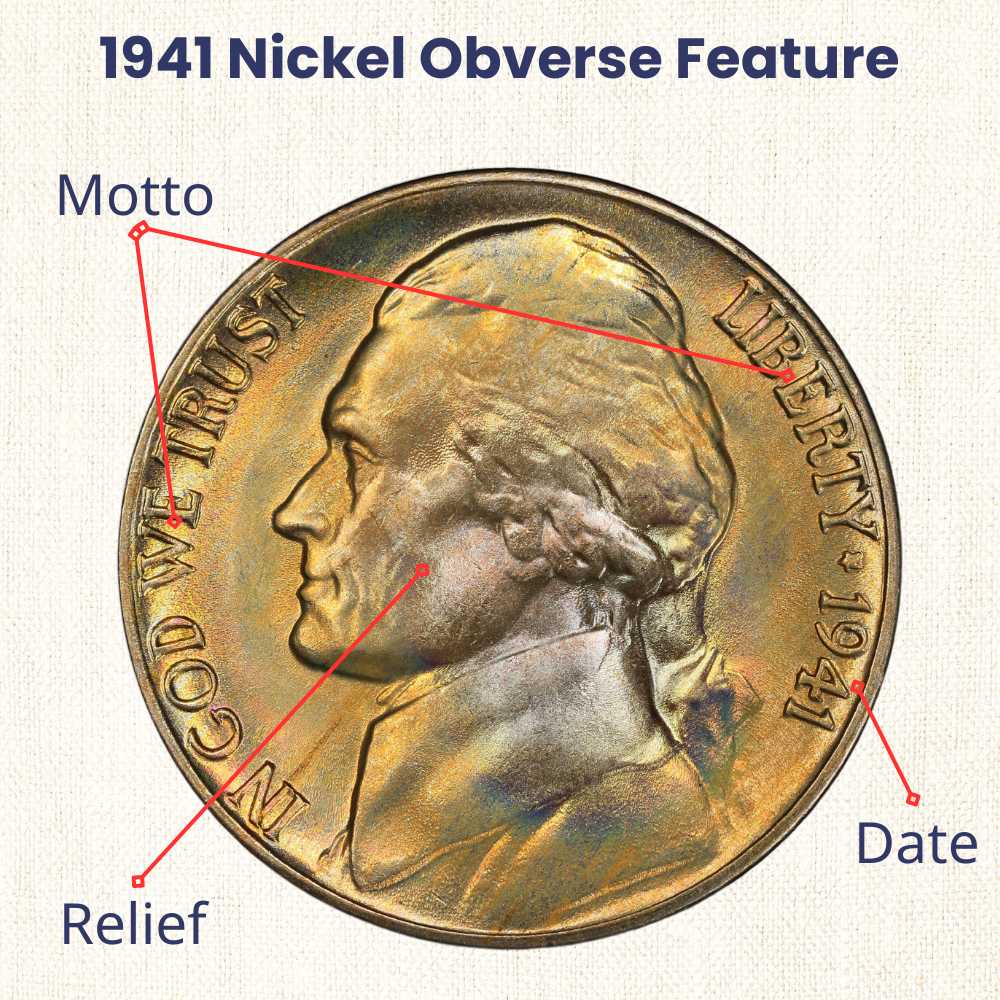
The obverse side of the Jefferson Nickel features President Thomas Jefferson facing to the left. The bust design includes fine details in his hair, skin tone, and attire. On the left side, you’ll see the words “In God We Trust” on the right, “Liberty” is present along with a five-point star beside it. These are above the year that the coin was minted.
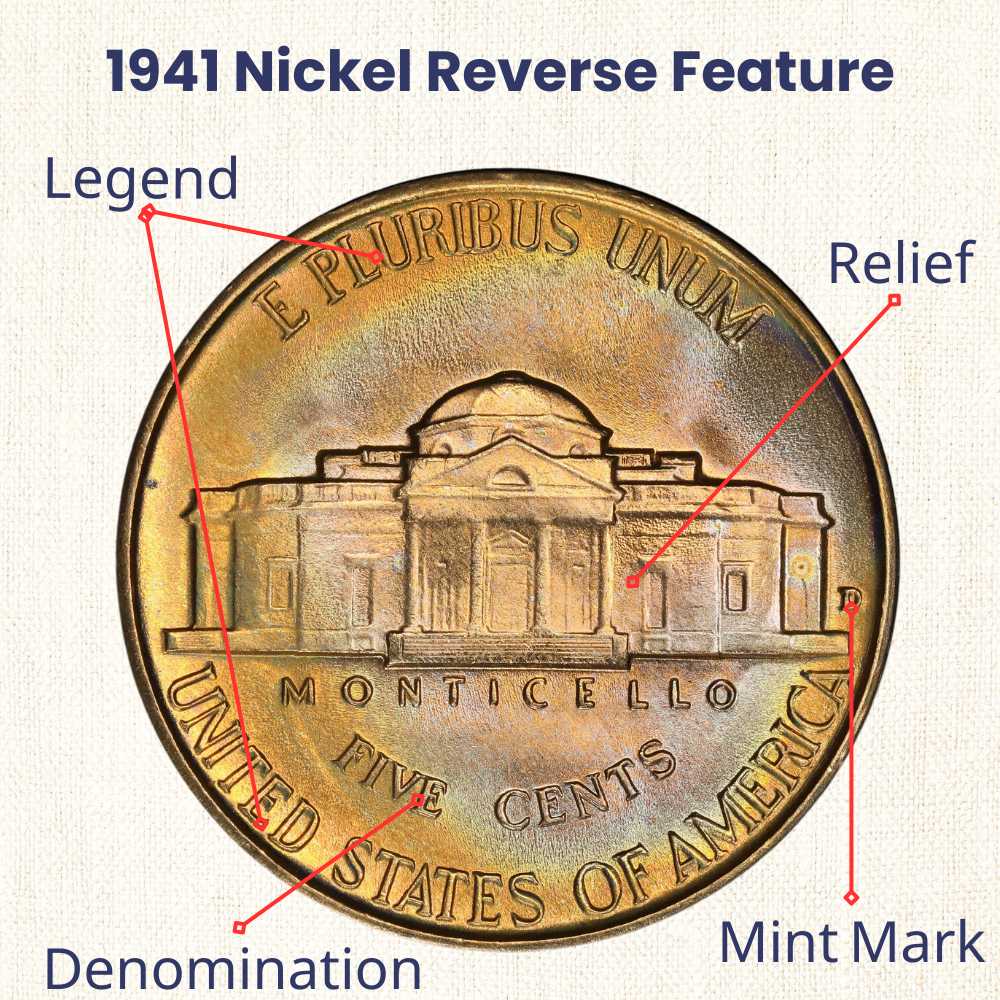
The reverse side features the Monticello as the centerpiece, and with that is the place’s name at the bottom. Below the steps is the text “Monticello” and its mintmark at the lower right. “E Pluribus Unum” is located above, with the coin denomination and “United States of America” at the bottom.
How Much Is A 1941 Nickel?
The regular strike 1941 Nickel has a base price of $0.10. This is regardless of the mint location. The value of the 1941 uncirculated coins varies depending on the number graded rather than the mint location.
Much like its predecessor, the Monticello Reverse also has a unique character strike. The 5FS and 6FS strike characters are special to Jefferson Nickels and were adopted by NGC in 2004 to identify Mint State coins. Before this change, only Full Step (FS) designations were used for these coins.
For a nickel to be considered a Full Step, at least five or six distinct and unmarred lines must be seen on the steps near the base of Monticello. Keep in mind that a nickel must also have a grade of MS60 or above before earning this honorable status.
It is worth noting that Full Step Jefferson Nickels are more readily available in the earlier years of the series. So, there are a significant amount of samples from this year with higher strike quality.
If you want to learn more about the Full Step strike character, you can read a guide here.
1941 P Nickel Value and Auction Record
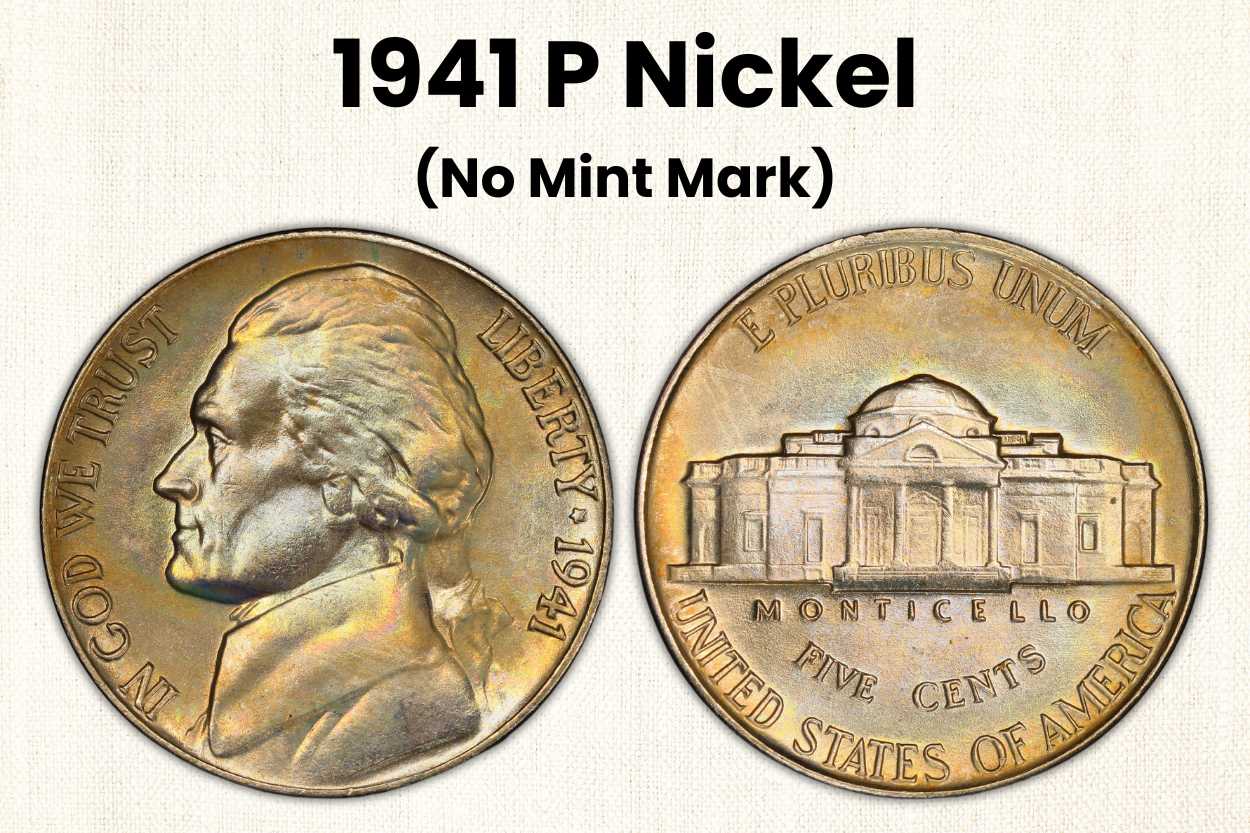
| 1941 Nickel: Grade and Value Chart | ||
| Grading | 1941 P Nickel | 1941 P 5FS Nickel |
| Good | $0.10 |
N/A |
| Fine | $0.15 | |
| Extremely Fine | $0.30 | |
| AU 50 | $0.50 | |
| AU 58 | $0.90 | |
| MS 60 | $1.20 | / |
| MS 61 | $1.45 | / |
| MS 62 | $2.50 | / |
| MS 63 | $5.00 | / |
| MS 64 | $10.00 | $25.00 |
| MS 65 | $25.00 | $40.00 |
| MS 66 | $40.00 | $100.00 |
| MS 67 | $80.00 | $600.00 |
| MS 68 | $500.00 | $5,000.00 |
This year, the Philadelphia Mint made a significant contribution to the mintage, producing a total of 203,265,000 coins for this series. It’s the largest amount out of all the mint locations! With that, the estimated value ranges from $0.10 to $500.
Much like many of the coins that came from the Philadelphia Mint at the time, this 1941 Nickel also do not sport any mintmark. Many of the 1941 P Nickel has been preserved in the MS-66 to MS-67 grading.
One of the most significant auction records for this mint location is this MS-68 Nickel from Heritage Auctions, which sold for $ 1,527.50.
1941 P Full Steps Nickel Value
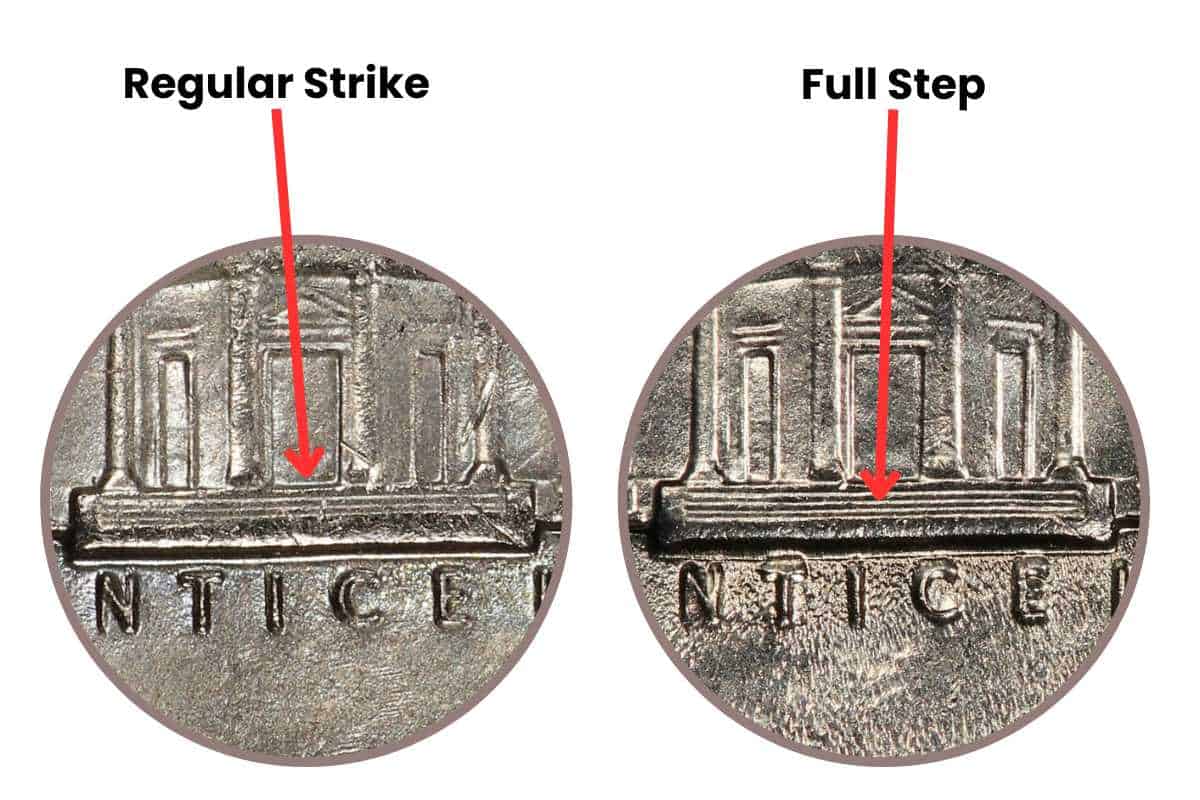
Having higher strike quality on the reverse side of the coin, this is the estimated price of the Full Step P Nickels. For the 5FS, 298 is graded, racking up a price of $25 to $5,000. Meanwhile, only 30 coins have a 6FS grade, giving it a $1,000 estimated price.
1941 D Nickel Value and Grading
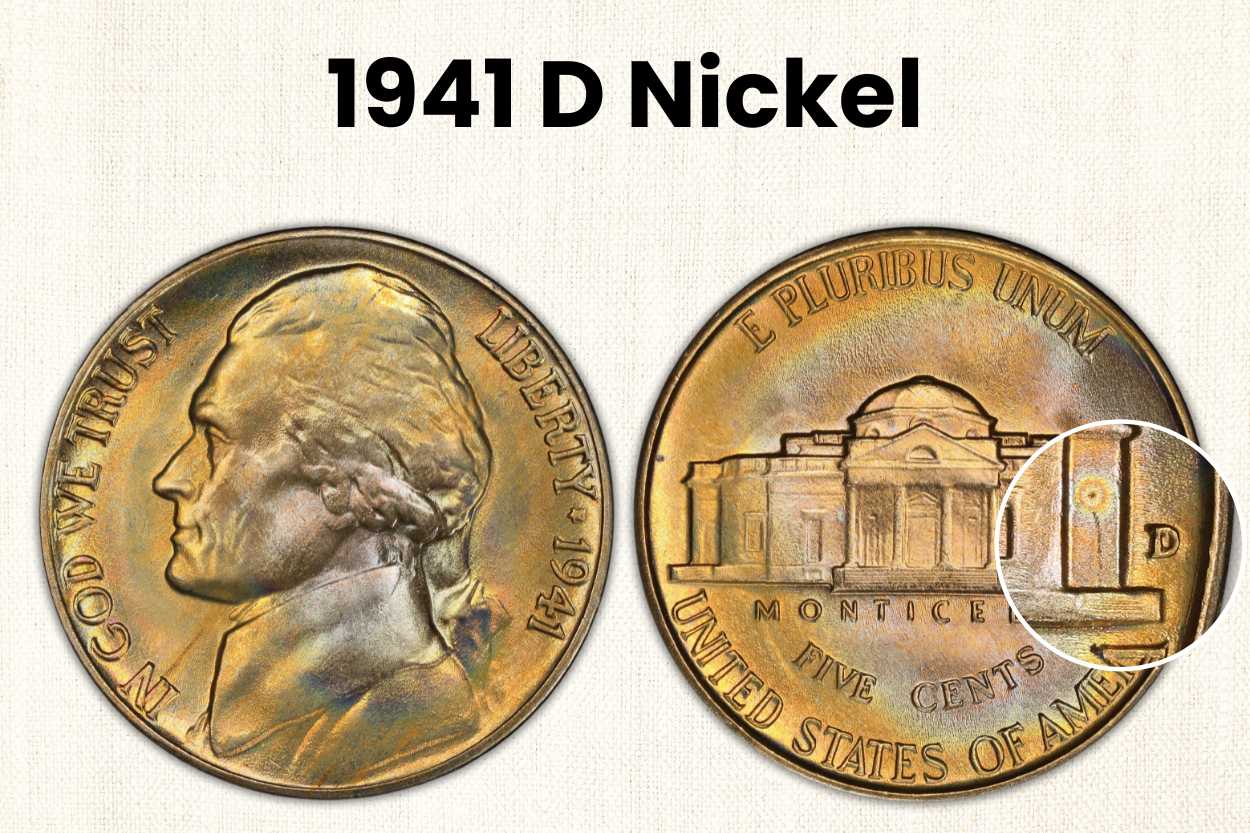
| 1941 D Nickel: Grade and Value Chart | |||
| Grading | 1941 D Nickel | 1941 D 5FS Nickel | 1941 D 6FS Nickel |
| Fine | $0.10 |
N/A |
N/A |
| Extremely Fine | $0.40 | ||
| AU 50 | $1.20 | ||
| AU 58 | $1.75 | ||
| MS 60 | $2.50 | / | / |
| MS 61 | $3.50 | / | / |
| MS 62 | $4.50 | / | / |
| MS 63 | $7.00 | / | / |
| MS 64 | $10.00 | $20.00 | / |
| MS 65 | $15.00 | $30.00 | / |
| MS 66 | $25.00 | $45.00 | $70.00 |
| MS 67 | $70 .00 | $185.00 | $300.00 |
| MS 68 | / | $4,000.00 | $8,250.00 |
The Denver Mint was responsible for creating some of the highest-quality nickels for 1941. Generally, nickels from this location have clear strikes and a shiny luster.
You can differentiate the Denver Nickel with the D mint mark and Monticello design. Around 53.4 million of these D nickels were released in 1941.
Compared to those minted in Philadelphia, the mintage of the 1941 D nickels is just a quarter. However, it’s still a relatively common find in circulated conditions.
Prices for these coins range from $0.10 to $1.75 for coins with a higher circulated grade. Meanwhile, the uncirculated grade can go from $2.50 to $70.
1941 D Full Steps Value
The Denver Mint produced many higher-quality strikes, so it also has a higher amount of 5FS and 6FS than the Philadelphia Mint. So, it provides more value than the prior mint location.
As we progress towards the higher grade levels of MS-68, we see a drastic shift, where Full Step coins of these grades become increasingly scarce. This results in a significant increase in price difference, reaching at least $4,000 for the 5FS and $8,250 for the 6FS.
1941 S Nickel Value and Auction Record
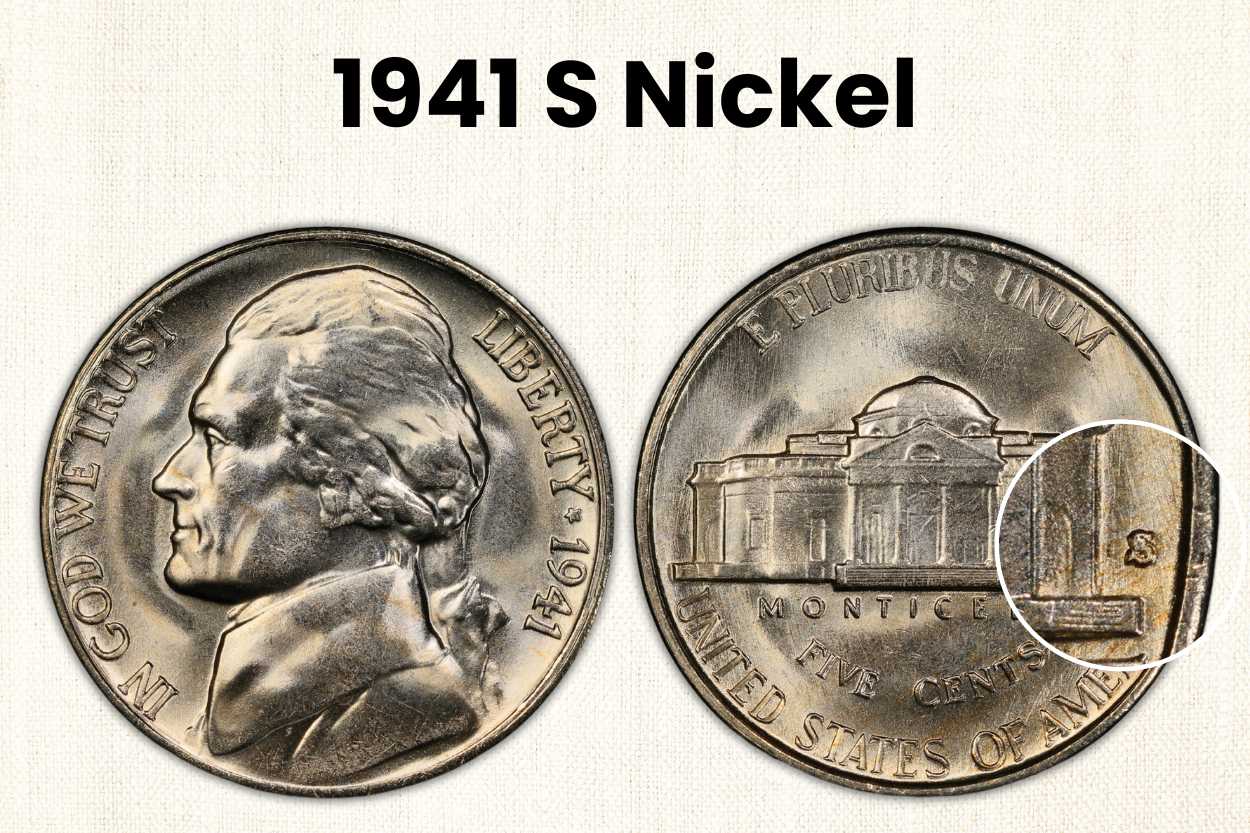
| 1941 S Nickel: Grade and Value Chart | ||
| Grading | 1941 S Nickel | 1941 S MS 5FS Nickel |
| Good | $0.10 |
N/A |
| Fine | $0.10 | |
| Extremely Fine | $0.40 | |
| AU 50 | $1.50 | |
| AU 58 | $2.10 | |
| MS 60 | $2.70 | $10.00 |
| MS 61 | $3.45 | $11.00 |
| MS 62 | $4.60 | $12.00 |
| MS 63 | $6.35 | $25.00 |
| MS 64 | $15.00 | $50.00 |
| MS 65 | $25.00 | $60.00 |
| MS 66 | $40.00 | $250.00 |
| MS 67 | $250.00 | $3,250.00 |
Back in 1941, the San Francisco Mint produced an estimated 43.4 million nickels. While this may seem like a small amount compared to other mints, it doesn’t significantly impact the value of these S nickels, which have a value of $0.10 to $250.
1941 S Full Step Value
Due to the lower strike quality from this mint location, the price for the Full-Step coin has a lower base at $10 for the 5FS. However, it can go as far as $3,250 for the highest grade which is MS-68. A very high jump in comparison to the $250 of the MS-67.
Meanwhile, the 6FS only has one estimated value which is $800 for the MS-66 grade.
1941 Nickel Proof Value
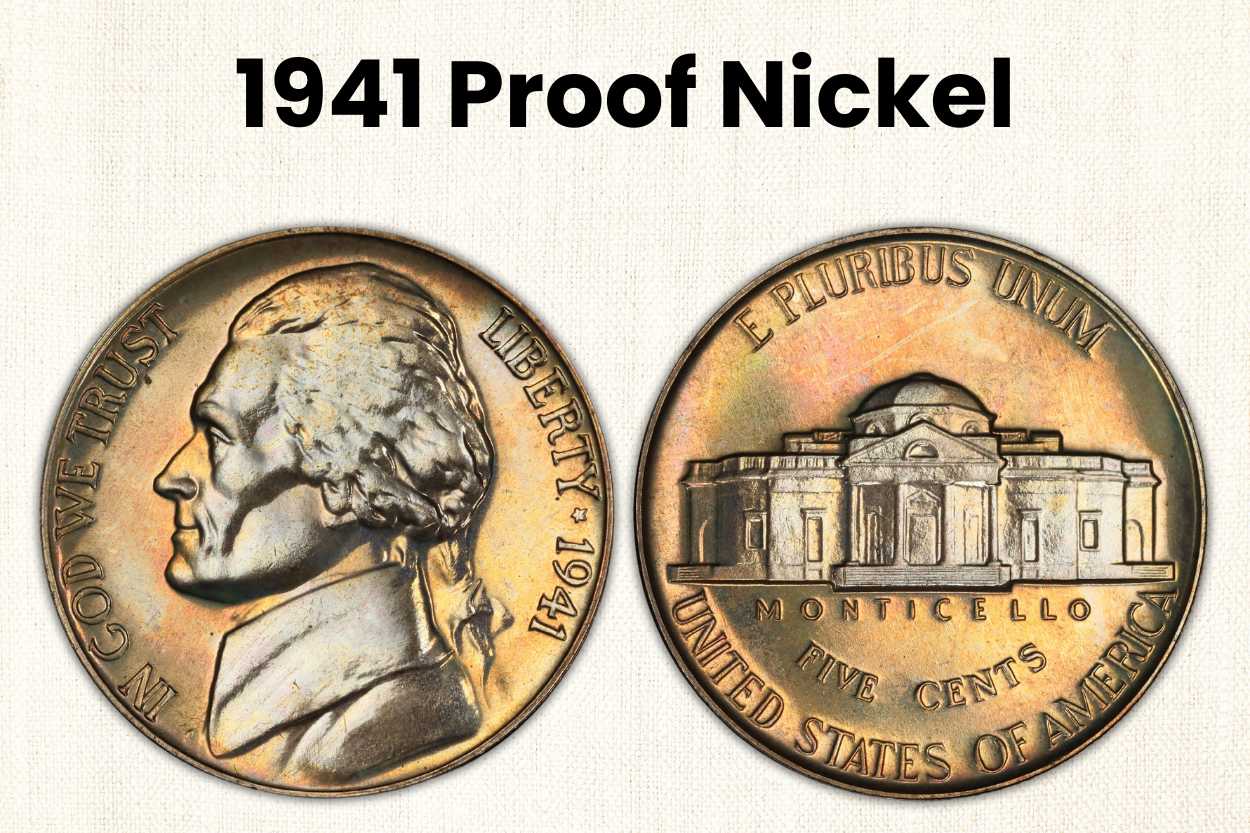
In 1941, the sales of proof nickels increased by a few thousand units as the interest in coin collecting grew. Despite this, finding pristine specimens may be challenging due to limited technology and inadequate storage methods at the time.
| 1941 Nickel PF Grading and Value | |
| Grading | 1941 MS Proof Nickel |
| MS PF 60 | $20.00 |
| MS PF 61 | $25.00 |
| MS PF 62 | $30.00 |
| MS PF 63 | $40.00 |
| MS PF 64 | $65.00 |
| MS PF 65 | $75.00 |
| MS PF 66 | $100.00 |
| MS PF 67 | $300.00 |
| MS PF 68 | $10,000.00 |
As for specifically seeking Cameo or Ultra Cameo for that year, you will be disappointed. These rare and high-quality strike is not available for the 1941 Nickel. However, the standard proof coin has an excellent value at $20 to $10,000.
1941 Nickel Error Coins
Although the 1941 Nickel has excellent quality most of the time, error coins are still available for this year. Most of them are struck and planchet errors, such as:
1. 1941 No Date Jefferson Nickel Struck Thru Late Cap Die
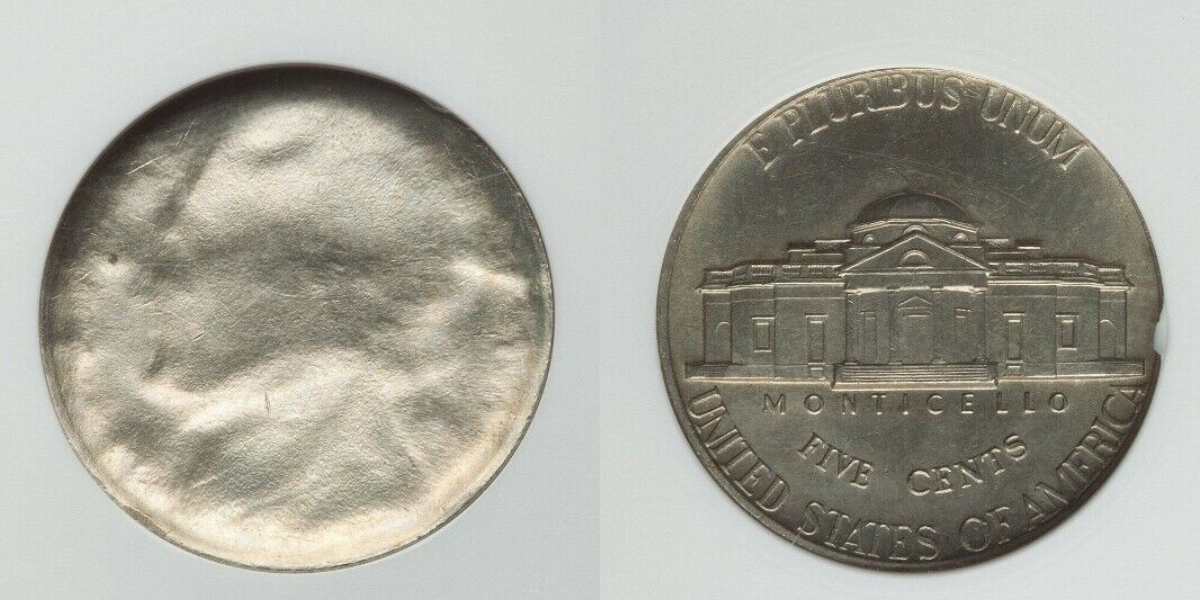
When a coin is struck using a deteriorated die, it may show an unclear imprint of the design on the edge, known as a Die Cap. Usually, this type of error occurs when the damaged die is used for hammering.
The result is a transfer of an almost ‘ghost’ image on the coin, where you only see some defining details. See this $198 MS-64 as an example. There are no major details transferred to the blank.
2. 1941 P Nickel Coin Strike Error
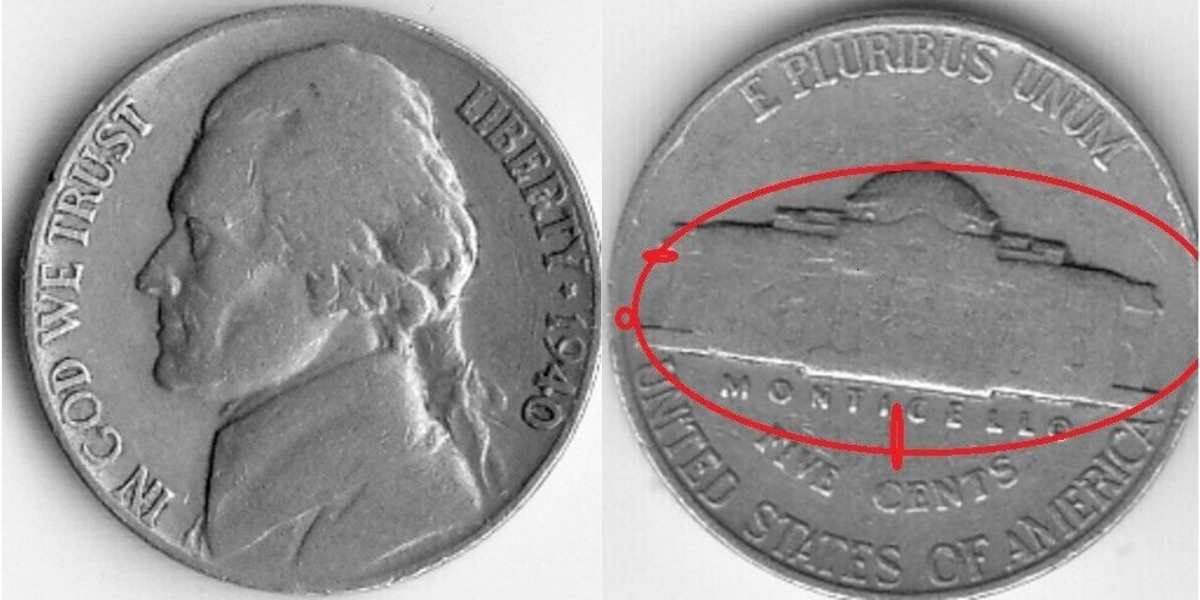
The strike error can be caused by things going wrong with the dies and planchets. The result is a design that’s not transferred well to the blank, such as this 1941 P Nickel that’s up for $111. You can see the engraving of Monticello does not transfer well, only leaving the outer details.
3. 1941 P Nickel 15% Clip Planchet
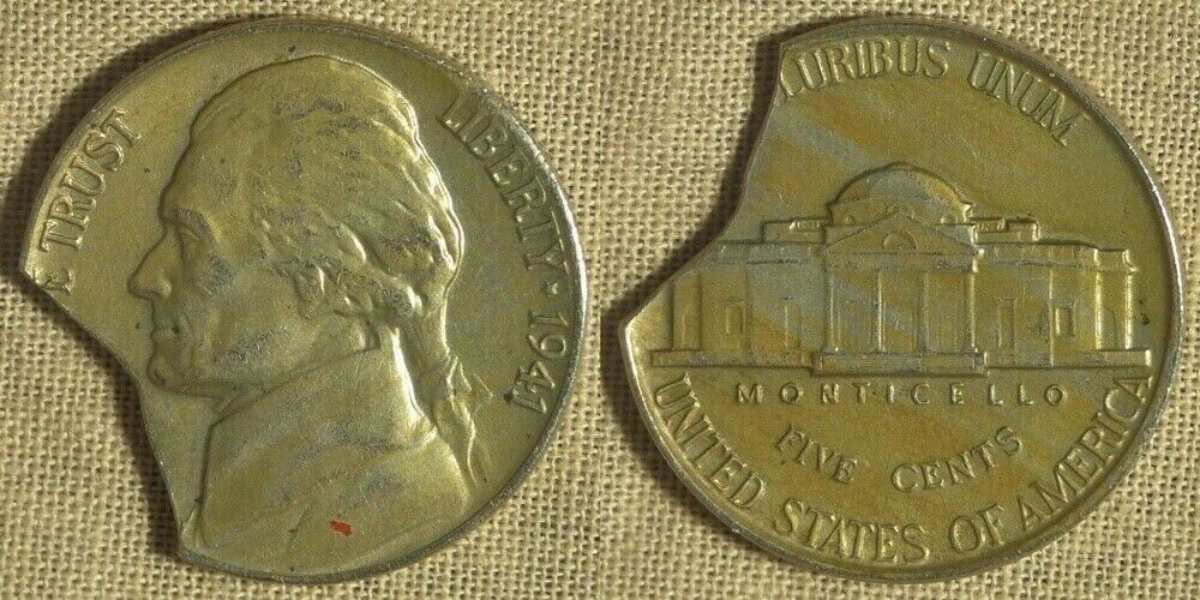
A clipped planchet or edge bite error coin is a type of coin that was struck on a partially formed blank. This happens when strips of metal are punched into coin-shaped blanks at a fast pace. If the machine does not push the strip completely forward after punching out a previous blank, the resulting planchet may appear irregular or incomplete.
See this 15% clip planchet, for example, chipping the left side of the coin. With a particular error, it has a price tag of $95.
4. 1941 S Jefferson Nickel S/S RPM Error
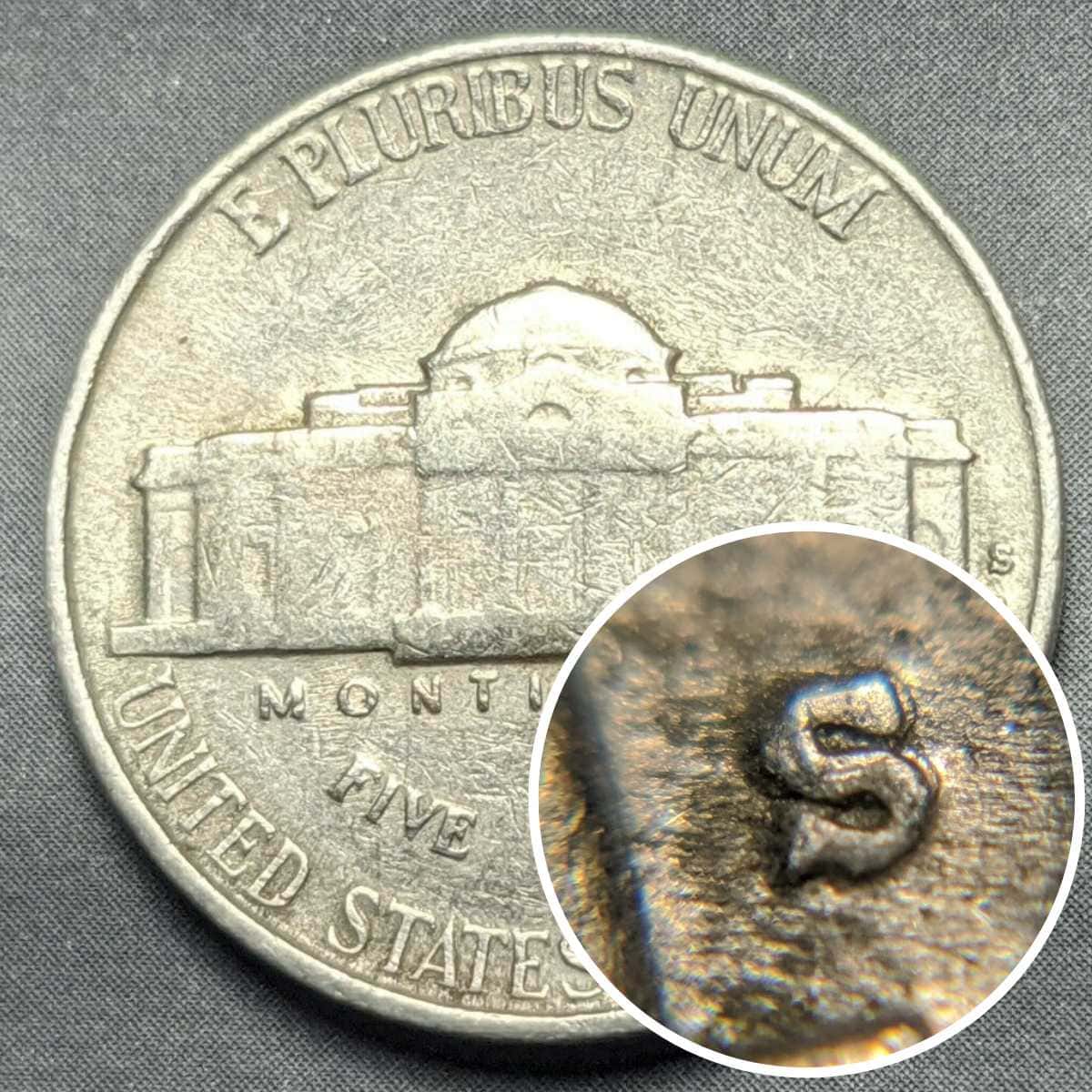
The error present on this coin is called repunched mint marks (RPM). It happened when the strike goes for multiple times instead of one clean transfer. This causes the engraving to overlap with each other, just like with this S/S 1941 Nickel, with a price of $35.
In Conclusion
In short, the 1941 provides excellent quality as it was part of the early strike of the Jefferson Nickel. Its estimated value for the circulated coins is relatively low at around $0.10 to $2.10. However, most of the higher prices will only come with Full-Step, Error, and Uncirculated coins.
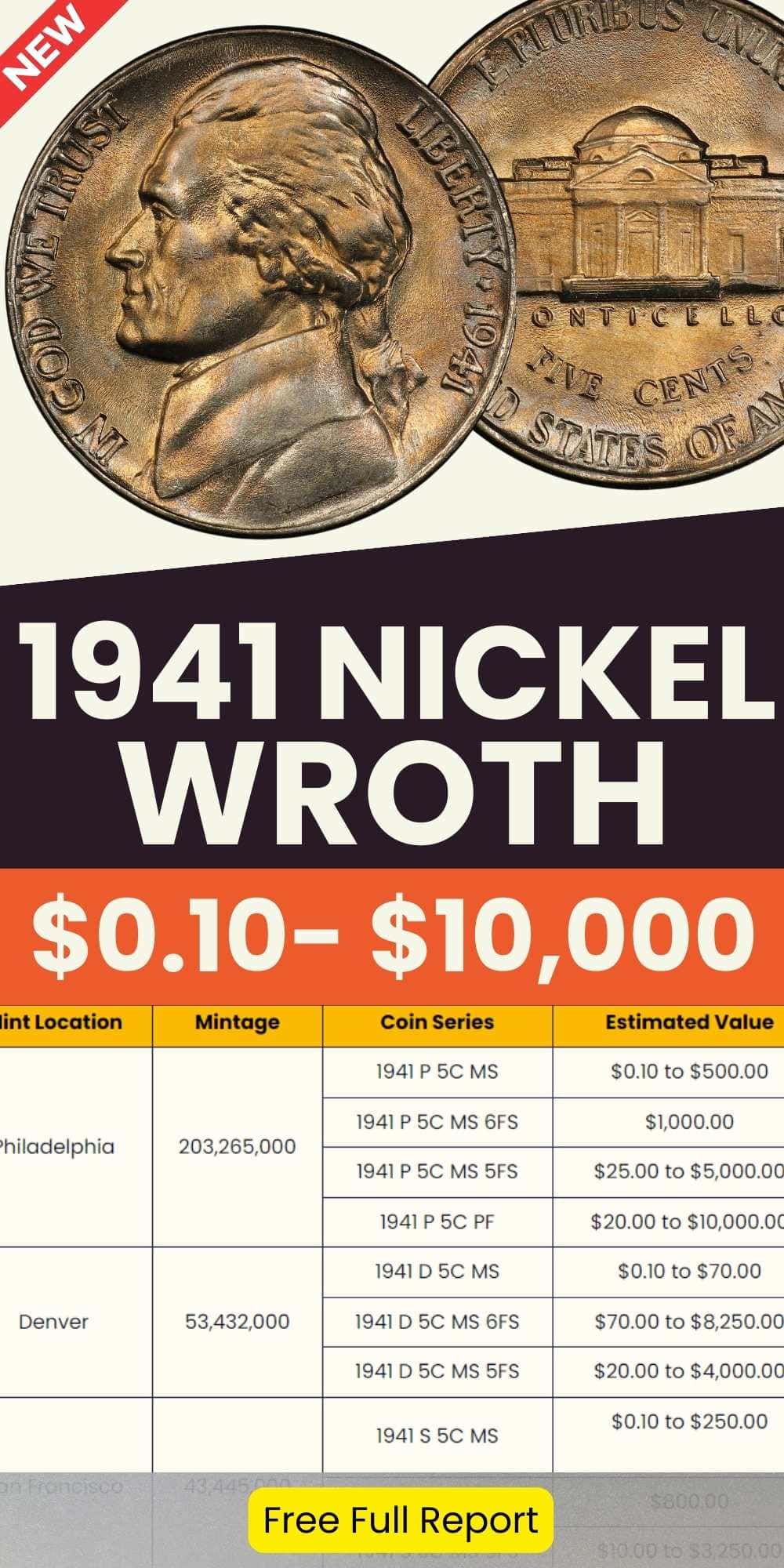

Jenson is a professional numismatist, a dedicated coin collector, a graduate of the College of Business at Oregon State, a life member of the American Numismatic Association (ANA), and an overall coin nerd. He is the founder of Coin Value List.

I have a 1941D Jefferson nickel that is smaller in diameter than a regular nickel. I cannot find any information about it. Can anyone help?
There are usually three possibilities
1. Counterfeit (especially if the size discrepancy is significant)
2. Post-Mint Damage (though this seems less likely)
3. Minting Error (for example: Off-Center Strike, Broadstrike Error, Defective Die Error, and Clipped Planchet Error can all lead to discrepancies in coin size)
These are just my opinions based on personal experience